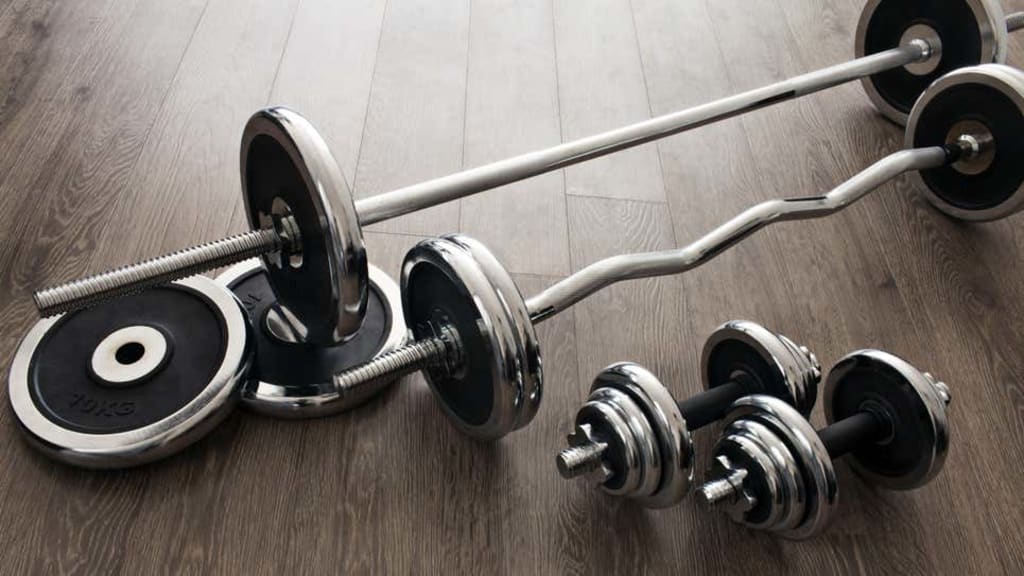
Free weights and hand weights, the two workhorses of free weight preparing, each enjoy quietly various benefits. Free weights are little; you hold one in each hand. A free weight is a more drawn-out, commonly two-gave carry-out. Many activities should be possible with possibly one. So how would you pick?
Free weights let you load more complete weight
To start with, we should check out a free weight's greatest benefit: its size. A few activities should be possible similarly to with one or the other kind of carry out, yet when you need to lift something truly weighty, you essentially need to utilize a free weight.
How about we use deadlifts for a model. Amateurs could possibly involve weighty free weights for their deadlifts, however even an all-around supplied rec center will not ordinarily have hand weights that go much over 100 pounds each. That is 200 pounds all out, which is just a fledgling deadlift. What's more, to set up for a 100-pounds-per-hand free weight lift, you'd need to some way or another get two 100-pound hand weights ready to move. That will be a weighty lift, both in a real sense and figuratively.
In the meantime, a free weight weighs 45 pounds, and it's generally simple to stack 45-pound plates onto it. Setting up for a 225-pound deadlift (two plates on each side) is a simple occupation once you know how to get it done.
Same thought with squats: It's no issue to stack up a couple of hundred pounds on a free weight in a squat rack, yet you'd have a truly difficult time holding monstrous hand weights on your shoulders, regardless of whether you could sort out some way to get them there. There are ways of squatting with more modest hand weights (challis squats are much harder than they look), yet for sheer weight on the bar, you really want, all things considered, a bar.
Free weights can be more agreeable
Free weights require your hands to be in a specific position. You can pick how far separated to put your hands, yet that is it; they're in those spots on the bar for the entire lift, and they must be agreed with one another.
Free weights are undeniably seriously sympathetic. You can do a seat press, for instance, while calculating the free weights toward one another. You can likewise hold them farther separated at the lower part of the development and unite them at the top. Assuming you have an old shoulder injury that bugs you when you do presses with a free weight, you might make some simpler memories with hand weights. Additionally, a straight bar can be awkward for twists, yet hand weights are a simple other option on the off chance that you don't have an EZ-twist bar (the wiggly kind).
Hand weights have a more modest least weight
Assuming you're a more modest or less experienced individual, you might observe that a void Olympic free weight is too weighty to even think about working with. A ton of amateurs can't upward press a 45-pound bar by any means. However, a couple of 5-pound or even 10-pound free weights is no issue by any stretch of the imagination, since they amount to 10 or 20 pounds, individually.
Regardless of whether you want to do free weight lifts, beginning with hand weights can allow you to develop the fortitude to arrive.
Hand weights permit better control overweight increments
Despite the fact that free weights have a more modest least weight, the leap starting with one weight then onto the next can appear to be colossal. Assuming you're sidelining with a couple of 50-pound free weights (100 aggregate), the following size up is likely 55 pounds (110 pounds all out), a 10% increment.
More modest leaps, somewhere in the range of 2% and 5%, are frequently more prudent. Assuming that you sidelined 100 pounds on a hand weight last week, you could toss on a couple of 2.5-pound plates and seat 105 this week, or even utilize a couple of microplates and go for 102.5. With free weights, you'll have to stay with the lower weight for longer before it's an ideal opportunity to climb. That is not the apocalypse, but rather it very well may be badly designed.
Hand weights require less space in a home exercise center
Imagine a scenario in which you need to purchase your own arrangement of loads for your home. Hand weights enjoy a major benefit here since an Olympic-sized hand weight is seven dag nab feet long. (There are more modest free weights made for home exercise centers, yet they are regularly difficult to stack extremely weighty, removing one of the primary benefits of hand weight.)
A couple of free weights scarcely occupies any room, either for capacity or while being used. The drawback here is that you'll need various loads of free weights for various activities (and to advance as you get more grounded in each activity), so then, at that point, you either need a few sets or a flexible set. Adjustables that let you change the weight rapidly (like Powerblocks) are costly; ones that have turn-lock collars are less expensive yet you'll invest more energy between practices evolving plates.
So what's the reality? To contend in a hand-weight sport like powerlifting, or then again in the event that you have your heart set on lifting truly weighty, you'll presumably involve free weights for a large portion of your preparation. Yet, to work with more modest loads, and assuming that space is at a higher cost than normal, you'll most likely incline toward hand weights. Toward the day's end, there's no reasonable victor among hand weights and free weights, and that is the reason such countless exercise centers have both.
About the Creator
Rashel
Rashel is an investigative journalist for Time, The Atlantic and other magazines.






Comments
There are no comments for this story
Be the first to respond and start the conversation.